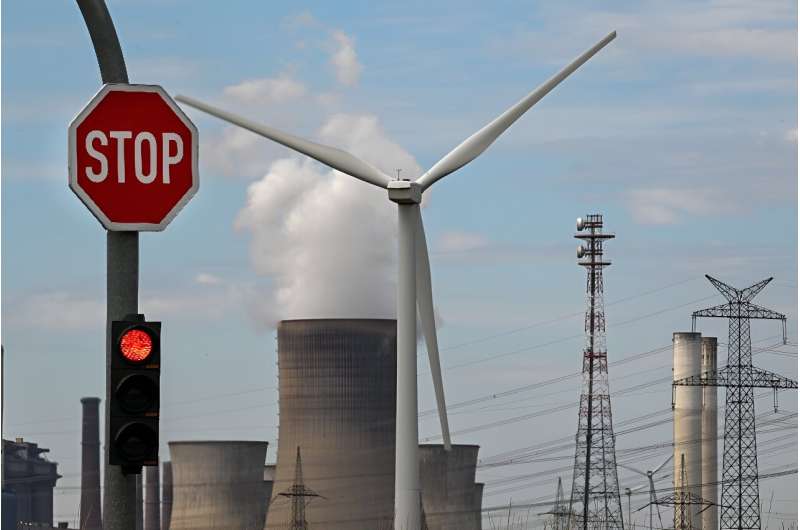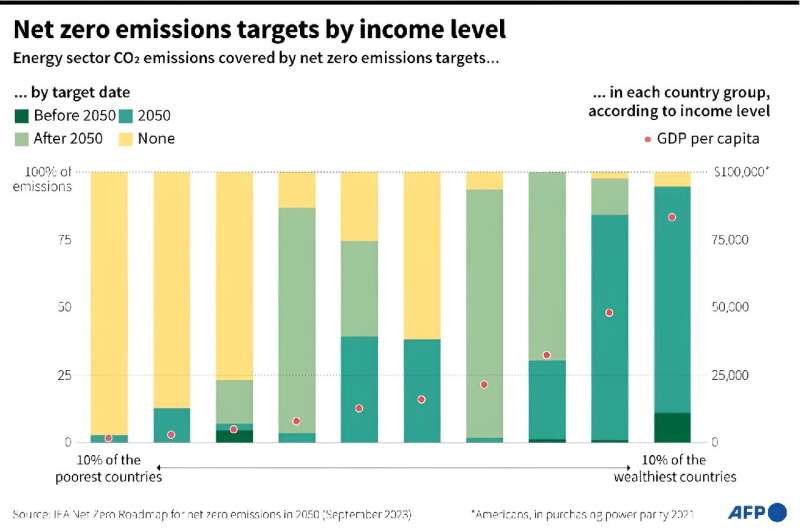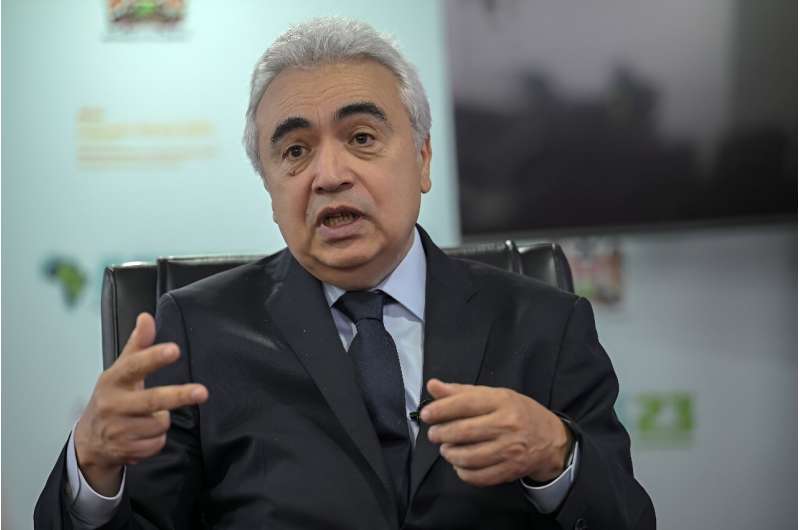This article has been reviewed according to Science X's editorial process and policies. Editors have highlighted the following attributes while ensuring the content's credibility:
fact-checked
reputable news agency
proofread
Rich nations, China must accelerate race to net zero: IEA

Rich and developing nations alike must sharply improve their net-zero targets, the International Energy Agency said Tuesday, warning that a clean energy surge was the main reason the world's climate goals are still achievable.
Wealthy countries must now reach carbon neutrality in around 2045, five years early, and China should speed up by a decade to 2050 to keep to the Paris goal of limiting warming to 1.5 degrees Celsius above pre-industrial levels, the IEA said.
"The world has already delayed too long to avoid hard choices," the global energy watchdog said.
The report, which comes ahead of crunch UN climate talks, updates the IEA's landmark 2021 "Net Zero Roadmap", which said new fossil fuel development was incompatible with global decarbonization by mid-century.
IEA chief Fatih Birol said he was more "hopeful" now than two years ago, thanks to record growth in solar power capacity and electric car sales in line with the IEA's pathway to net-zero emissions.
He praised "very impressive" policies in the United States, Europe, China and India that have helped drive clean energy investment up 40 percent to $1.8 trillion this year.
But he added that to reach net zero this needs to reach $4.5 trillion by 2030.
"This is a Herculean task," he told reporters.
Clean tech hope
The energy sector is "changing faster than many people think", the IEA said, adding that together these clean energy technologies are projected to deliver a third of the emissions reductions needed by 2030.

But it warned of the negative impact of increased fossil fuel investments and "stubbornly high emissions" during the post-pandemic economic rebound and the energy crisis driven by Russia's invasion of Ukraine.
It laid out a potential pathway for the energy sector—the largest single source of greenhouse gas emissions—to achieve net-zero emissions and contribute towards curbing warming to 1.5C.
This includes global renewable power capacity tripling this decade, energy efficiency improvement rates doubling, sales of electric vehicles and heat pumps surging, and energy sector methane emissions falling 75 percent.
A "huge policy-driven ramping up of clean energy capacity" is needed, the IEA said, driving fossil fuel demand 25 percent lower by 2030.
"The pathway to 1.5C has narrowed in the past two years, but clean energy technologies are keeping it open," said Birol.
The IEA this month forecast that world demand for oil, gas and coal would peak this decade thanks to the "spectacular" growth of cleaner energy technologies and electric cars.
But far from resting on that success, Birol said countries need to work together to substantially speed up climate action.
The IEA said staying on track "means almost all countries must move forward their targeted net zero dates".
Its pathway was based on an "equitable" redistribution of targets, pulling forward China and richer countries to allow developing nations more breathing space to decarbonize after 2050, it said.
Even a small delay in ramping up emissions cuts beyond the current pledges "would cause global temperature to exceed 1.5C for almost 50 years", the report warned.

And it said if the world's current oil and gas fields and coal plants operate to the end of their lifespans, the world would significantly overshoot its CO2 budget to stay within 1.5C.
Singling out China, the IEA said the country is projected to account for 45 percent of emissions from existing fossil fuel assets between 2023 and 2050.
'Expensive and unproven'
At just under 1.2C of warming so far, the world has already seen a crescendo of deadly and destructive extreme weather.
A recent UN progress report on the Paris goals warned the world was not on track to limit warming to 1.5C.
The world's energy future will be at the heart of debates at the UN's COP28 climate summit in Dubai, a major oil producer, between November 30 and December 12.
"In Dubai, the COP presidency will have to show what post-fossil fuel leadership looks like," said Laurence Tubiana, head of the European Climate Foundation.
The IEA warned countries not to pin their hopes on so-called carbon removal technologies—to extract CO2 molecules from the atmosphere and store them permanently—if emissions reductions are too slow.
It said a scenario of delayed climate action would force the world to rely on these "expensive and unproven at scale" technologies.
If such technologies fail to deliver at the scale needed—including effectively filtering 0.1 percent of Earth's atmosphere every year by 2100—the IEA said returning temperatures to 1.5C "would not be possible".
© 2023 AFP




















